As a responsible dog owner, you’re always looking for new and nutritious treats that can spice up your pup’s diet without compromising their health. You might have heard about the hearts of Palm and wondered whether they are safe for your dog. If you’re curious, “Can dogs eat hearts of palm?“ you’re not the only one.
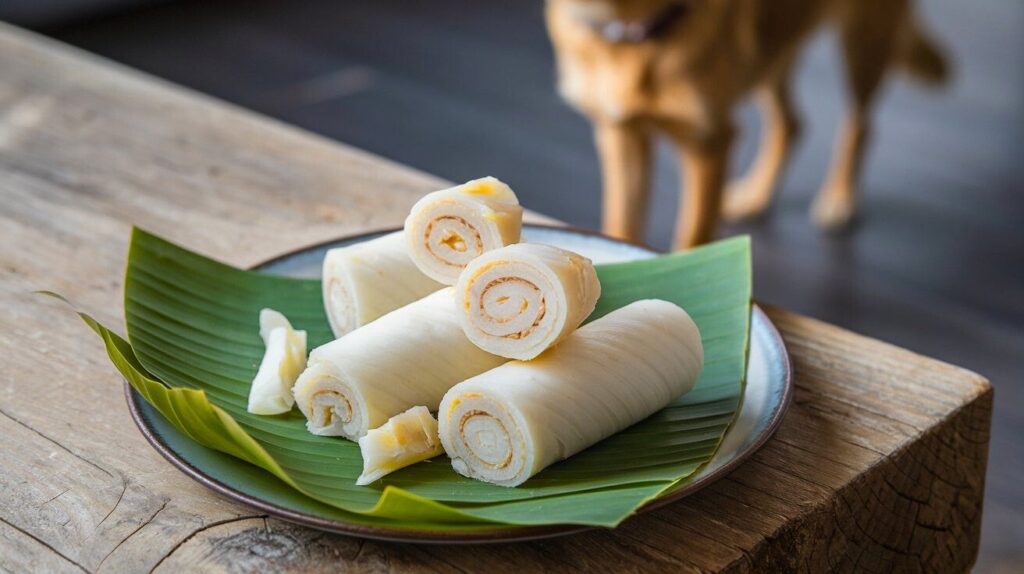
This vegetable, commonly enjoyed by humans for its nutty flavour and crunchy texture, might seem like a healthy option for your furry friend. However, before adding it to their bowl, it’s important to consider how it compares to other fresh options like raw chicken meat, raw chicken bones, or even raw chicken drumsticks, which many dog owners choose for their high protein content and natural calcium sources.
What Are Hearts of Palm?
Hearts of Palm are harvested from the inner core of certain palm tree species, such as the coconut and acai palm. This vegetable is recognized for its versatility in various dishes, from salads to savoury dips. Nutritionally, hearts of Palm are rich in fibre, protein, and several essential minerals, including potassium, calcium, and zinc, making them a beneficial addition to human diets.
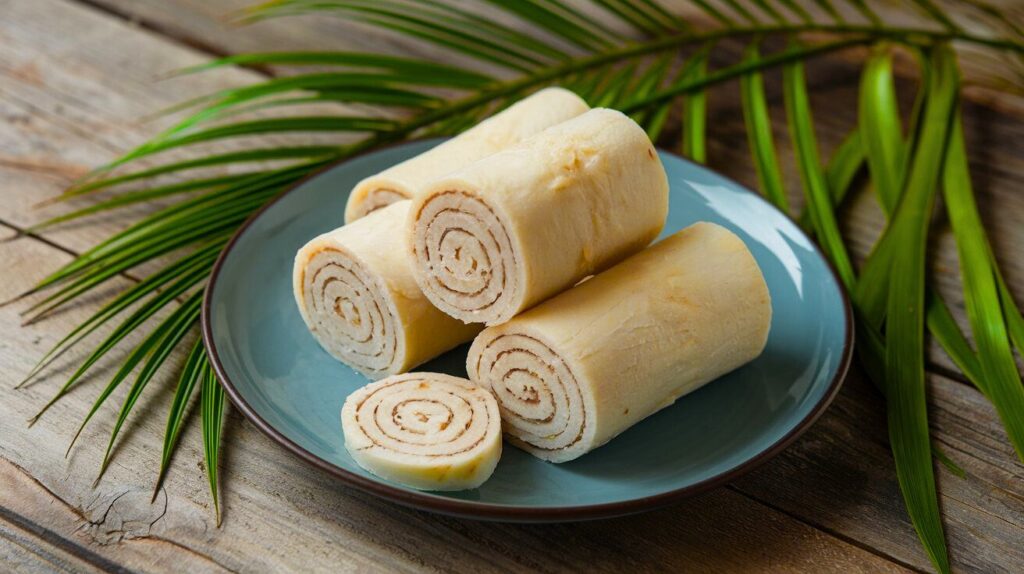
However, unlike raw chicken meat, which offers a complete source of protein, or raw chicken bones, which are packed with calcium, hearts of Palm lack some of the essential nutrients that dogs require for a balanced diet. Moreover, while raw chicken drumsticks can support bone health and muscle development, feeding them safely requires preparation to avoid potential risks such as salmonella or bone splintering.
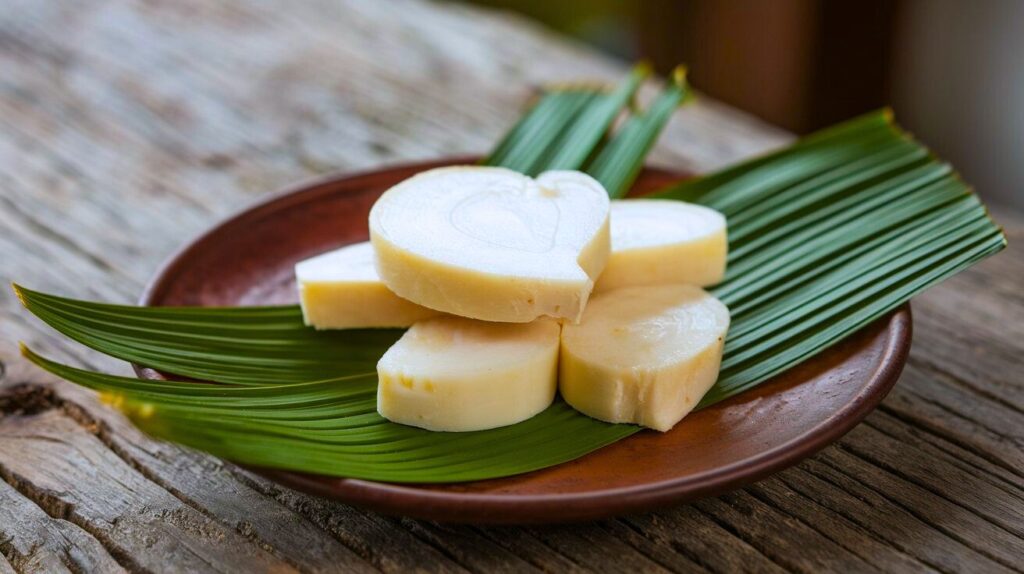
Similarly, adding seasonings like Tajín—a popular spice blend made of chilli, lime, and salt, may seem tempting to enhance flavour, but it’s best avoided for dogs. The high salt content and potential for stomach irritation make Tajín unsuitable for canine consumption.
| Nutrient | Amount per 100g | % Daily Value (DV) |
|---|---|---|
| Calories | 36 | – |
| Protein | 4 grams | – |
| Fat | <1 gram | – |
| Carbohydrates | 4 grams | – |
| Fiber | 4 grams | – |
| Potassium | 38% | – |
| Phosphorus | 20% | – |
| Copper | 70% | – |
| Zinc | 36% | – |
| Iron | 2.3 mg | 13% |
| Magnesium | 27.8 mg | 7% |
| Sodium | 14 mg | <1% |
| Vitamin B6 | 0.1 mg | 5% |
| Vitamin C | 5.6 mg | 9% |
| Folate | 29 mcg | 7% |
Nutritional Suggestions
So, while hearts of Palm can be given in moderation as an occasional treat, they should not replace nutrient-dense options like carefully prepared raw chicken or beef products, such as raw beef heart, raw beef fat, or raw beef kidney.
These organ meats provide concentrated sources of essential nutrients like taurine, vitamin B, and healthy fats that are crucial for muscle growth, energy, and overall vitality in dogs. However, just like with other raw foods, it’s crucial to handle them with care.

The high-fat content in raw beef fat, for example, should be balanced to prevent weight gain, while raw beef kidney should be introduced gradually to avoid digestive upset. It’s also vital to ensure all organ meats are fresh and served plain, without any seasonings or additives such as spices, as these can cause adverse reactions.
This detailed comparison helps highlight the differences in nutritional benefits and potential risks, ensuring you make the best choice for your dog’s health. For more information on feeding dogs raw food and the proper preparation techniques, check out trusted sources such as WebMD and Perfectly Rawsome.
The values in the table are referenced from the nutritional data available on Wikipedia for heart of Palm.
However, when considering the hearts of Palm for dogs, it’s important to look beyond the human plate. When properly prepared, this vegetable’s texture and form are suitable for safe canine consumption. As a dog owner, understanding the full nutritional impact and potential risks of any new food is crucial for maintaining your dog’s health and well-being.
Nutritional Benefits of Hearts of Palm for Dogs
Digestive Health:
Hearts of Palm are celebrated for their high fibre content, which is crucial in regulating a dog’s digestion. Fiber aids in maintaining smooth bowel movements and can be especially beneficial for dogs with irregular digestion. However, it’s important to moderate the intake, as excessive fibre can lead to gastrointestinal issues such as bloating and diarrhoea.
Muscle and Nerve Health:
Another significant benefit of including hearts of Palm in your dog’s diet is the presence of potassium. This essential mineral supports muscle health and improves nerve function, contributing positively to your dog’s overall mobility and energy levels. Potassium is vital for maintaining heart health and the proper functioning of muscles and nerves in canines.
Weight Management:
Low in calories yet rich in nutrients, hearts of Palm is an excellent snack choice for dogs that are overweight or require a controlled calorie intake. They provide a satisfying treat without the added weight risks associated with higher-calorie snacks.
Can Dogs Eat Hearts of Palm?
Yes, dogs can eat hearts of Palm in moderation. Hearts of Palm are non-toxic and offer health benefits such as fibre, protein, and essential minerals like potassium and calcium. However, feeding them excessively can cause digestive issues like bloating or diarrhoea. Always introduce hearts of Palm gradually, chop them into small pieces, and opt for low-sodium or salt-free varieties to avoid health risks.
Potential Health Risks for Dogs Eating Hearts of Palm
While Hearts of Palm can serve as a healthy treat in moderation, there are potential health risks that dog owners should be aware of. Choking hazards and dietary imbalances are among the primary concerns when introducing this vegetable to dogs.
Choking Hazards
The shape and texture of the hearts of Palm could pose a choking risk, especially for smaller dogs or those that tend to eat quickly. Similarly, raw chicken feet, which are often given as a treat for their high collagen and glucosamine content that support joint health, can also present a choking hazard if not monitored properly.

To minimize these risks, it’s crucial to slice the hearts of Palm into small, manageable pieces that your pet can easily chew and swallow, just as you would supervise your dog while enjoying raw chicken feet to ensure they don’t swallow them whole. Taking these precautions will help keep your pet safe while allowing them to enjoy these treats in moderation.
Dietary Imbalances
Hearts of Palm are low in essential nutrients such as proteins and fats, which are crucial for a dog’s balanced diet. Relying too much on the hearts of the Palm can lead to nutritional deficiencies. Ensure that this treat is only a small part of a well-rounded diet.
Sodium Content
Another significant concern is the sodium content in canned hearts of Palm. High sodium levels can be harmful to dogs, potentially leading to sodium ion poisoning if consumed in large amounts. Symptoms of too much sodium include vomiting, diarrhoea, lethargy, and more severe health issues like kidney damage or seizures. Choosing fresh or rinsed canned hearts of Palm can help reduce these risks.
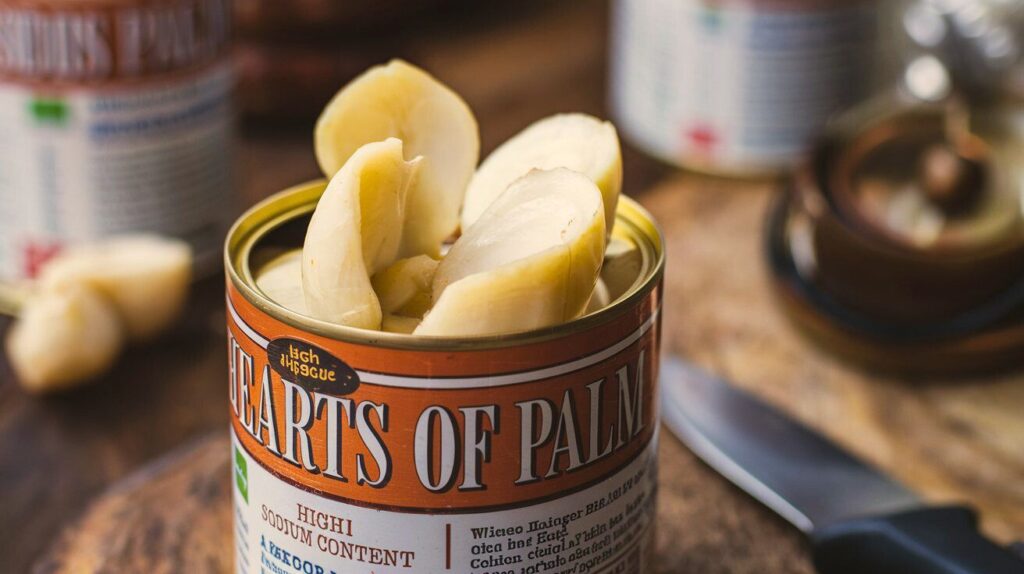
Healthy Alternatives to Hearts of Palm
When it comes to feeding our furry friends, opting for dog-safe vegetables is both a healthy and wise choice. Incorporating fresh fruits and vegetables into your dog’s diet can significantly boost their vitamin intake while offering a safe snack alternative to processed treats.
Vegetables Good for Dogs
- Carrots: Crunchy and packed with fibre and vitamin A, carrots are excellent for your dog’s dental health and vision.
- Green Beans: Rich in iron and vitamins, these can be a low-calorie treat, especially good for weight management.
- Cucumbers: Perfect for a hydrating snack during hot weather, cucumbers are low in calories and contain important vitamins.
Table: Nutritional Content of Dog-Safe Vegetables and Fruits
| Food Item | Key Nutrients | Benefits |
|---|---|---|
| Carrots | Fiber, Vitamin A | Dental health, vision |
| Green Beans | Vitamin C, Iron | Weight management |
| Cucumbers | Vitamin K, Water | Hydration, low calorie |
| Apples | Vitamins A & C, Fiber | Skin health, digestion |
| Blueberries | Antioxidants, Vitamin C | Immune system, brain health |
Fruits Safe for Dogs
- Apples (without seeds): A sweet treat rich in vitamins A and C, good for your dog’s skin and coat health.
- Blueberries: Blueberries are known as a superfood, and they are packed with antioxidants and vitamin C, which help maintain healthy brain function and a robust immune system.

Commercial Dog Treats
While many commercial treats are available, it is crucial to select those formulated specifically for canine nutrition. These treats consider the dietary needs of dogs, ensuring that they receive the right balance of nutrients without unnecessary fillers.
Homemade Treat Options
For those who prefer a more hands-on approach, homemade treats can be a fun and safe way to pamper your pet. Recipes might include:
- Lean meats: Cooked chicken or turkey, avoiding any onions or garlic.
- Oats: Great for sensitive stomachs and packed with fibre.
- Unsweetened applesauce: Adds a hint of sweetness without the sugar rush.
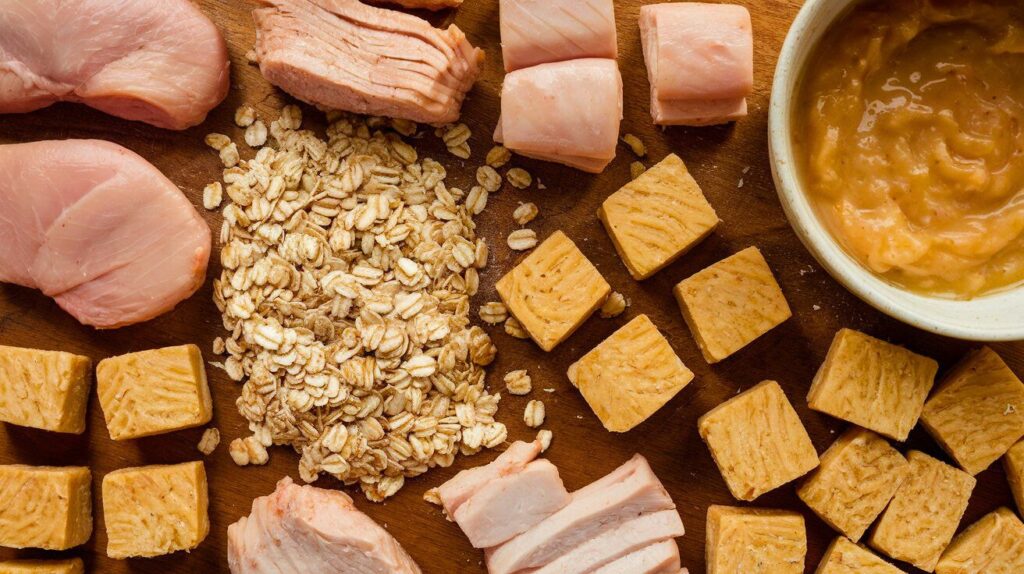
Conclusion
Giving your dog some heart of Palm as a treat can totally be okay as long as it’s done carefully and not too often. However, like any treat, it should not become a staple of their diet but rather a supplementary item given occasionally. The key benefits of Hearts of Palm, such as low calories and fibre content, offer some advantages, especially for dogs that require a lower-calorie diet. Still, the lack of essential proteins and fats means it cannot meet all your pet’s nutritional needs.
Common Questions and Concerns
Can dogs eat Heart of Palm safely?
Yes, dogs can safely enjoy Hearts of Palm in moderation. These are non-toxic and can be a low-calorie treat suitable for pets. However, it’s essential to introduce them gradually to your dog’s diet to monitor any potential allergic reactions or digestive upset. As with any new food, start with small amounts and observe your pet closely.
What are the benefits of feeding dogs hearts of Palm?
Hearts of Palm are a beneficial treat for dogs primarily due to their fibre and potassium content. Fiber aids in healthy digestion, helping to regulate bowel movements and support overall gut health. Potassium is crucial for maintaining proper nerve function and muscle health, which are vital for your dog’s energy levels and mobility.
What risks should dog owners be aware of with Hearts of Palm?
When feeding your dog hearts of Palm, be aware of potential risks such as choking hazards due to their shape and size. Also, the high fibre content, while beneficial, can lead to digestive upset if consumed in large amounts. Always ensure that hearts of Palm are appropriately prepared—sliced into small, manageable pieces—and offered in moderation.
How often can dogs eat hearts of Palm?
Hearts of Palm should be considered an occasional treat rather than a regular part of a dog’s diet. Feeding dogs hearts of Palm too frequently can disrupt their nutrient balance due to its limited protein and essential fat content. It’s best to use them sparingly, ensuring they complement a well-rounded diet.
Are there healthier alternatives to Hearts of Palm for dogs?
Yes, several healthier alternatives offer similar nutritional benefits without the risks associated with hearts of Palm. Low-calorie vegetables like carrots and cucumbers are excellent options. Carrots provide beta-carotene, fiber, and vitamins, while cucumbers contain minimal calories and are hydrating, both making great snacks for dogs when given in appropriate amounts.





